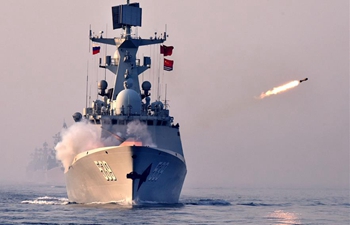BERLIN, May 10 (Xinhua) -- German industrial giant Thyssenkrupp and its Indian competitor Tata Steel are assuming that the planned merger of their European steel activities "will not materialize", Thyssenkrupp announced on Friday.
Thyssenkrupp and Tata "expect the European Commission to block the planned steel joint venture" due to "continuing concerns", the German industrial company said in a statement.
The two companies had offered "significant further concessions" to the European Commission but they both felt that "further commitments or improvements would adversely affect the intended synergies of the merger", according to the German steel company.
The German steel company is also planning to cut around 6,000 jobs over the next three years, of which two-thirds would be in Germany, said Guido Kerkhoff, chief executive officer (CEO) of Thyssenkrupp.
Since these were "far-reaching cuts", redundancies for operational reasons could not be ruled out, said Oliver Burkhard, Thyssenkrupp's head of human resources, said Oliver Burkhard.
"For IG Metall, the joint venture has always been associated with risks for jobs," commented Knut Giesler, regional director of North Rhine-Westphalia at Germany's largest trade union IG Metall.
"This is why we have ensured that a collective agreement will provide employees with long-term security in the event of the joint venture coming into being. This long-term security is also needed under new conditions," added Giesler
The planned merger between Thsyssenkrupp and Tata Steel would have created the second largest steel producer in Europe after ArcelorMittal.
The European Commission began investigating the merger last October amid concerns that competition, particularly regarding steel supplies to the automotive industry, could be affected.
On Friday, the German steel giant also announced that it was no longer planning to split its own industrial operations into two parts, one for the company's industrial sectors and another for its materials businesses.
"Economic downturn and its effects on business development and the current capital market environment" had led the executive board to reassess the company's strategic options, the German industrial giant announced.
Thyssenkrupp said its executive board "will propose to the supervisory board to not go ahead with the planned separation into two independent companies".
Instead of the split, the German industrial giant wanted to "fundamentally realign itself" by increasing the flexibility of its portfolio approach as well as introducing "a leaner holding structure and a stronger performance orientation".
As a result of the reintegration of its European steel business, the German industrial giant announced it was expecting adjusted earnings (EBIT) of 1.1 to 1.2 billion euros (1.24 to 1.35 billion U.S. dollars) for the current fiscal year.
Thyssenkrupp's announcement was well received on the stock market, with company shares increasing by more than twenty percent on Friday.
On Wednesday, the German company's stock had fallen to its lowest level in 15 years.













